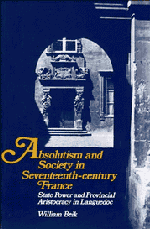 Absolutism and Society in Seventeenth-Century France
Absolutism and Society in Seventeenth-Century France Book contents
- Frontmatter
- Contents
- List of tables
- List of figures
- Preface
- List of abbreviations
- Map: Languedoc in the seventeenth century
- PART ONE INTRODUCTION
- PART TWO THE DISTRIBUTION OF AUTHORITY
- 3 Urban setting and local authorities
- 4 The sovereign courts: a provincial perspective
- 5 The royal agents: a national linkage
- 6 The Estates: central bargaining place
- PART THREE THE PROVINCE ON ITS OWN
- PART FOUR THE PROVINCE AND THE CROWN
- Conclusion
- Appendix: Breakdown of taxes from the diocese of Toulouse, 1677
- Select bibliography
- Index
5 - The royal agents: a national linkage
Published online by Cambridge University Press: 05 July 2011
- Frontmatter
- Contents
- List of tables
- List of figures
- Preface
- List of abbreviations
- Map: Languedoc in the seventeenth century
- PART ONE INTRODUCTION
- PART TWO THE DISTRIBUTION OF AUTHORITY
- 3 Urban setting and local authorities
- 4 The sovereign courts: a provincial perspective
- 5 The royal agents: a national linkage
- 6 The Estates: central bargaining place
- PART THREE THE PROVINCE ON ITS OWN
- PART FOUR THE PROVINCE AND THE CROWN
- Conclusion
- Appendix: Breakdown of taxes from the diocese of Toulouse, 1677
- Select bibliography
- Index
Summary
Insinuating themselves among the long-established governing institutions of the province were the royal agents. Their attentions were devoted to enacting the king's program directly and expeditiously, as compared to other authorities who might view themselves as equally loyal to the king and state, but who would nevertheless filter the royal wishes through an interpretive screen of corporate, provincial, and private considerations. There was nothing new about having direct agents of the crown in the province, either in the form of envoys sent out to reside for a time and oversee some particular business, or as resident natives who sought personal advancement by serving the king's interests. Both had existed for centuries. Even in the heyday of royal power the intendant was never the solitary commissar of the textbooks, enacting authoritarian state policy in the midst of a hostile population. Nevertheless, as all commentators have pointed out, the years after 1630 did represent a turning point in that the official intendants de justice, police et finances did reside longer, do more, and have much greater impact than their predecessors.
They were still supplemented by many other agents. There were temporary royal commissioners who came and went according to the rhythm of business, the military commanders, and various local residents – prelates, robe officers, even merchants – who served the king consistently enough to be considered agents, despite their provincial roots.
- Type
- Chapter
- Information
- Absolutism and Society in Seventeenth-Century FranceState Power and Provincial Aristocracy in Languedoc, pp. 98 - 116Publisher: Cambridge University PressPrint publication year: 1985
